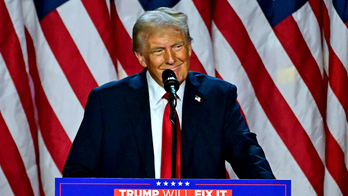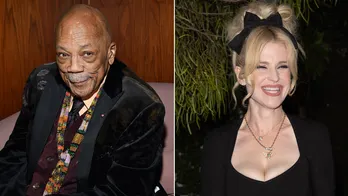Alarming new trend is emerging as younger Americans eschew alcohol on dates, go more for cannabis
Gen Z Americans are drinking less than previous generations and skipping alcoholic beverages on dates. Still, researchers warn the age group is compensating with cannabis, which in excess could lead to serious health complications.
A report from Berenberg Research found that Gen Z respondents were drinking over 20% less per capita than millennials did at the same age. Furthermore, 64% of Gen Z respondents anticipated that they would drink alcohol less frequently when they grew older versus today's older generations.
Gen Z respondents also said they drank less because of health and hangover-related concerns as well as the fear of being judged by peers or parents, according to Berenberg researchers.
Sam Shaw, a strategy director at the behavioral insights firm Canvas8, said his company has recently explored the "sober-curious trend" among Gen Z, also known as "damp drinking."
GEN Z WANTS LESS SEX IN MOVIES AND TELEVISION; EXPERTS SAY TECHNOLOGY AND DELAYED ADULTHOOD COULD BE WHY

Gen Z is indulging in alcohol significantly less than previous generations. However, doctors warn that cannabis use is on the rise. ((Photo by Bruce Bennett/Getty Images))
While some say that social media and camera phones are driving soberness, with Gen Z concerned about the consequences of being captured out of control, Shaw said the bigger story is about respect and control.
"Prior generations used to drink as a way to escape from reality. Gen-Z flip this. They use soberness to stay in the room. They want to tune in, not tune out to the moment. Being drunk on a date and losing control just doesn't seem like a smart idea," he said.
Gen Z, versus past generations, has a greater acceptance of individual differences and has allowed them to confront peer pressure and respect personal choice, according to Shaw.
"In this context, soberness is simply understood as a positive life choice and a healthy place from which to start a relationship," he added.
A survey from the dating app Hinge earlier this year found that three out of four users prefer not to go out for drinks as a first date. Gen Z are also more likely than Millennials to pick alcohol-free first dates.
Additionally, nearly one in three Gen Z users said they do not consume alcohol on the average date.
I AM GEN Z. MEN IN MY GENERATION ARE NOT DATING. WHY SHOULD WE?
A 2019 National Drug Strategy Household survey appeared to back up this data, finding that people in their twenties who chose to abstain from alcohol had more than doubled between 2001 and 2019, going from 9% to 22%.
Tara Suwinyattichaiporn, a Los Angeles-based sex and relationship coach and tenured professor at California State University Fullerton, said that Gen Z's commitment to mindfulness and self-care has significantly impacted the trend of sober dating among the age group.
According to Suwinyattichaiporn, a viral TikTok sex educator, Gen Z is reluctant to repeat patterns seen throughout their upbringings, such as alcoholic parents fighting and divorcing and watching influencers die from drugs.
"Sober dating allows for people to make conscious relationship and sex decisions, which is healthier for singles who are actively dating," she added.
Dr. Jessica Watrous, Licensed Clinical Psychologist and the Director of Clinical and Scientific Affairs at Modern Health, said the trend of sober dating could be reflective of the overall changing attitudes toward alcohol as a social activity.
DECODING GEN Z: FROM 'SIMP' TO 'STAN,' THE LINGO YOUR KIDS ARE USING THAT YOU NEED TO KNOW

Close-up shot of two women having a drink at the bar. (iStock)
"Outside of just dates, we're seeing more restaurants offer non-alcoholic drink menus, there are more no- or low-alcohol beverages commercially available, reflecting that more consumers are interested in some of the social aspects of being out, maybe on dates, and not necessarily being under the influence of alcohol," she added.
Many experts who spoke with Fox News Digital said Gen Z is drinking less primarily because they are more aware of the harmful effects of alcohol.
More than one-quarter of Gen Z respondents say they are "very concerned" about the potential health effects of drinking alcohol, according to Civic Science.
Over time, consuming alcohol can lead to the development of numerous health complications, such as high blood pressure, heart disease, stroke, liver disease and memory issues. It may also lead to at least eight different forms of cancer, according to the Centers for Disease Control and Prevention (CDC).
GEN Z OPTING FOR TEXTING DUE TO ‘PHOBIA’ OF PHONE CALLS, RESEARCH REVEALS
In general, it seems that Gen Z is a more health-conscious generation.
Doctors who spoke with Fox News Digital said the Gen Z group is exercising more and more likely to go to therapy or seek other forms of mental health care. Therefore, hearing about the physical and psychological health risks of alcohol may affect their decisions to drink if they're focused on taking care of their bodies.
"I've heard people make the analogy that younger generations would look at the ubiquity of alcohol use in older generations the same way that Millennials did at smoking in their parents' and grandparents' generations," Watrous said.
Between 2002 and 2018, those between 18 and 22 in the U.S. who did not drink alcohol in college increased from 20% to 28%. For those not in school, the numbers went from about 24% to 30%, according to researchers at the University of Michigan and Texas State University.
UNDERAGE DRINKING DANGERS: THESE ARE THE STATES WITH THE HIGHEST RATES OF TEEN ALCOHOL USE, STUDY FINDS

Just one alcoholic beverage a day could spike blood pressure, an American Heart Association study revealed. (iStock)
Furthermore, alcohol abuse among both Gen Z groups decreased by around 50%.
Gen Z has less interest in alcohol in general, according to data from Statista Consumer Insights.
Between 18 and 20% of Americans between 21 and 28 years old said they regularly drank beer, wine, or spirits. For millennials born between 1980 and 1994, alcohol consumption was much higher, with 31% of respondents consuming beer and wine regularly.
Russell Surasky, a double board-certified neurologist and addiction medicine doctor, said that those born between 1997 and 2010 are significantly reducing their alcohol intake. This is not just a blip in the statistics. As he noted, this reduction has been heading that direction for the last 15 years.
Over 40% of Gen Z'ers between 21 and 25 have never tasted an alcoholic beverage, according to Surasky, a statistic backed up by Neilsen.
"Regular alcohol use, it just doesn't fit into [Gen Z's] health-oriented paradigm," he said.
DRINKING ALCOHOL WEEKLY COULD BE CONNECTED TO 61 DIFFERENT DISEASES, STUDY FINDS

Marijuana plants display buds as they are in the flowering stage at the indoor growing facility of Mockingbird Cannabis in Raymond, Mississippi, on Jan. 20, 2023. (AP Photo/Rogelio V. Solis, File)
However, a troubling trend has emerged as alcohol use among young generations has decreased.
"Are there positive signs involving trends with drinking? Absolutely. I don't want to take away from that. But there is strong evidence that for a relatively large percentage of Gen Z'ers, a reduction in alcohol has coincided with an uptick in cannabis use," Surasky said.
Despite the typically positive portrayal of cannabis by the media, Surasky and Caron Treatment Head of Psychiatry Dr. Adam Scioli said the drug is far from harmless for susceptible individuals.
Scioli, who also acts as the Corporate Medical Director for Caron, said the pandemic and the prevalence of remote work have led to more young Americans experimenting with cannabis to reduce stress and anxiety.
However, Scioli said research has indicated that cannabis happens to make every mental health condition worse rather than better.
"Ultimately, over time, the neurotransmitter balances toward what we would say is an excitation rather than relaxation," he said. "So, you end up with a situation where you can get a heightened anxiety and certainly depression."
MARIJUANA WITH HIGH THC LEVELS LINKED TO ADDICTION, PSYCHIATRIC ILLNESS, STUDY FINDS
Marijuana has also led to more severe mental health ramifications for those with certain predispositions.
"For susceptible individuals, marijuana use can lead to psychosis," Surasky added. "If you have an underlying mental health issue like bipolar disorder, it's been shown to increase the chance that you're going to have a manic or severely depressive episode, which could be a life-threatening situation for certain people. There's even been some evidence that it could perhaps trigger schizophrenia or at least trigger it to occur earlier in life."
Scioli emphasized that while the trend among Gen Z appears to be less alcohol and more cannabis, there will continue to be people in the age category who will present significant alcohol use disorders to their friends, family and peers.
CLICK HERE TO GET THE FOX NEWS APP
While the overall alcohol use consumption among Gen Z has declined, Scioli noted that the rate of young people in need of serious intervention remains steadfast.
"Of those patients who present to residential treatment, we have noticed a pretty significant and scary trend of women coming in younger and sicker and requiring significant medical intervention long term, including liver transplants," he added.
For more Culture, Media, Education, Opinion and channel coverage, visit foxnews.com/media.
Disclaimer: The copyright of this article belongs to the original author. Reposting this article is solely for the purpose of information dissemination and does not constitute any investment advice. If there is any infringement, please contact us immediately. We will make corrections or deletions as necessary. Thank you.







